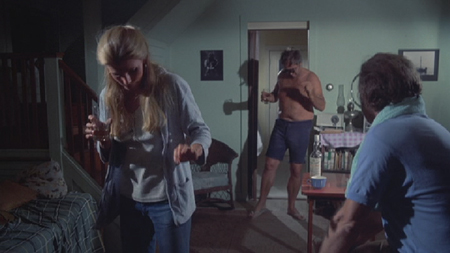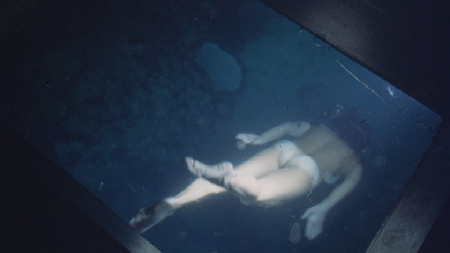STUDIO: Warner Home Video
MSRP: $19.97
RATED: R
RUNNING TIME: 99 Minutes
SPECIAL FEATURES:
• Theatrical trailer
• “The Day of the Director” featurette
The Pitch
"It’s Gene Hackman playing a quietly desperate investigator. Hey, it worked for Coppola and Friedkin!"
The Humans
Gene Hackman, Jennifer Warren, young James Woods, pubescent Melanie Griffith.
The Nutshell
Gene Hackman is Harry Moseby, a private detective with no love for either his job or his life. His wife is having an affair with a total stranger; his job is a dead end, the cases few and far between. So, when a friend at the police station passes him a missing person case, he jumps on it. A girl named Delly (Melanie Griffith, often without clothes) has run away from her mother, a Norma Desmond-type. Moseby tracks the girl to the

Moseby was out of luck. He had never bothered to learn
the Down South Mating Dance.
The Package
Like
The sound is mixed with the music too high and the dialogue too low. Important bits of dialogue, spoken quietly because the scene calls for it, are lost behind tone music and, occasionally, ambient sound effects. It’s a bit frustrating, because it’s so important in a story with this many twists to be able to follow the spoken logic of the protagonist.
By way of extras, there is a theatrical trailer, and a short featurette. The latter is a welcome addition to an otherwise bare-bones release. The featurette, called "The Day of the Director," is a typical filmmaking 101, but filtered through director Arthur Penn’s point-of-view. Penn clearly and good-naturedly lays out his frustrations with the process of filmmaking and second-guesses himself on important decisions. It’s brief, not even ten minutes, and contains a bit of marketing fluff, but it’s quantifiably better than nothing.

Melanie Griffith demonstrates that nudity repels sharks.
Further demonstration is required.
The Lowdown
I miss 70s Gene Hackman. The guy had some great roles in noir: Popeye Doyle in The French Connection, Harry Caul in The Conversation. Night Moves isn’t quite on the level of those two, but it is an engaging mystery with subtext a-plenty. Hackman’s Moseby doesn’t let much get to him; he has built walls of snide but honest humor to deflect most everything. When something does get through — such as the infidelity of his wife — he explodes and then contracts, as though collapsing on his own gravity. Throughout the second act, he is insular, focused, and yet somehow still personable, affable. Hackman is at fine form throughout.
The performances are easily the
The relationships Moseby fosters are such a strength in the narrative that they diminish the plot, which could put some viewers off. The majority of Penn’s energy went to the sketching of relationships, with the weak balance being given to plot development. As a result, the money, the driving force for the antagonists, comes from someplace completely contrived, and when the number of deaths starts to ramp up in the third act, there are unfortunate coincidences that distract from the drama. After the leisurely second act, this quickened pace feels forced.
While it loses some of its cohesion at the end, the larger measure of the film is tight and thoroughly absorbing. If you like your noir full of subtle dialogue, ragged marriages, bare breasts, and satisfyingly bleak endings, Night Moves is a good choice, even if the title has only a passing connection to the film.
7.0 out of 10

 BUY IT AT AMAZON:
BUY IT AT AMAZON: